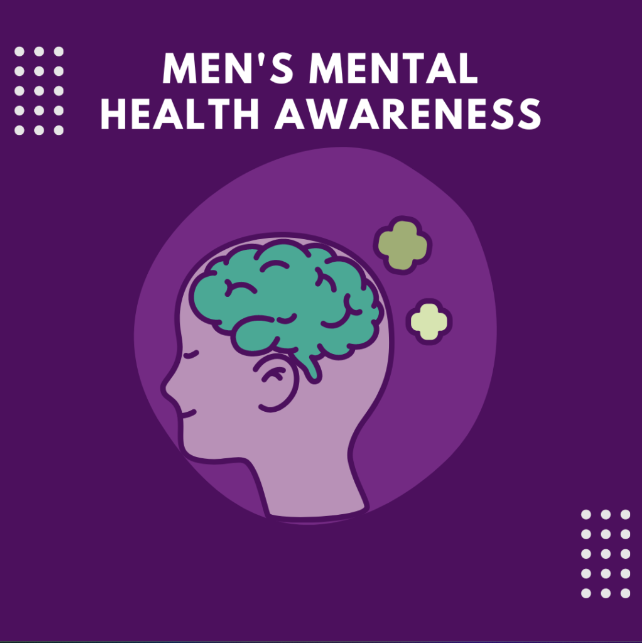Men’s Mental Health , observed in June, serves as a critical reminder of the importance of addressing the mental well-being of men in our society. Mental health issues affect everyone, regardless of gender, and recognizing this fact is the first step towards creating a more inclusive and supportive environment for men to seek help, share their struggles, and find healing.
The Silent Struggle
Historically, men have often been conditioned to hide their emotions and tough it out in the face of adversity. This societal expectation can be damaging, as it discourages men from expressing their feelings and seeking help when they are facing mental health challenges. Consequently, many men silently grapple with issues like depression, anxiety, and stress, without ever reaching out for assistance.

The Importance of Men’s Mental Health Month
Men’s Mental Health Month shines a spotlight on this often-overlooked aspect of well-being. It provides a platform to discuss the unique challenges that men face in relation to mental health, such as the pressure to conform to traditional notions of masculinity. By acknowledging these challenges, we can break down the stigma surrounding men’s mental health and create a more supportive society.
Addressing Stigma and Stereotypes
One of the main goals of Men’s Mental Health Month is to challenge stereotypes and eliminate stigma. Stereotypes that depict men as unemotional, stoic, and invulnerable can deter them from seeking help. It’s important to convey that seeking support is a sign of strength, not weakness. Men should feel comfortable discussing their feelings, fears, and concerns, just as women do.
Encouraging Conversations
Open and honest conversations are the cornerstone of raising awareness about men’s mental health. Men need safe spaces where they can share their experiences without judgment. Community organizations, workplaces, and educational institutions can play a crucial role in facilitating these dialogues. Encouraging men to talk about their mental health experiences can help them feel less isolated and more understood.
Access to Resources and Support
Men’s Mental Health Month also highlights the availability of resources and support systems. It’s important to inform men about the various mental health services, including counseling, therapy, and helplines, that are accessible to them. Additionally, family and friends should be educated on how to recognize signs of mental distress in their loved ones and how to offer support.
Promoting Holistic Well-being
Well-being isn’t just about addressing mental health issues when they arise; it’s also about preventive measures. Men should be encouraged to adopt a holistic approach to their well-being. This includes maintaining a healthy lifestyle through regular exercise, a balanced diet, and adequate sleep. These practices can significantly contribute to mental resilience.
Supporting Men’s Mental Health Beyond June

While Men’s Mental Health Month is a dedicated time to focus on this important issue, it’s crucial to remember that the conversation and support should continue throughout the year. Here are some ways to support men’s mental health beyond the designated month:
- Education: Promote education about mental health from an early age. Encourage schools to include mental health awareness in their curriculum, teaching students about emotions, stress management, and seeking help when needed.
- Workplace Initiatives: Employers can play a significant role in supporting men’s mental health by implementing workplace wellness programs, offering counseling services, and creating a culture where employees feel comfortable discussing their mental health.
- Community Support: Community organizations, sports clubs, and social groups can foster environments where men can connect, share their experiences, and receive support. These networks can reduce feelings of isolation and provide valuable resources.
- Family and Friends: Encourage family and friends to be attentive to the mental well-being of the men in their lives. Normalize conversations about feelings, stress, and mental health concerns, and let loved ones know they can always reach out for support.
- Media Representation: Advocate for responsible media portrayal of men’s mental health issues. Positive and realistic depictions can help reduce stereotypes and make it easier for men to seek help.
- Access to Affordable Care: Advocate for accessible and affordable mental health care for everyone. This includes removing barriers to mental health services, addressing insurance coverage gaps, and increasing the availability of mental health professionals.
- Peer Support Programs: Establish peer support programs where men who have experienced mental health challenges can mentor and support others who are going through similar struggles.
- Celebrate Success Stories: Highlight success stories of men who have overcome mental health challenges. These stories can inspire others to seek help and pursue their own paths to recovery.
- Advocacy and Policy Change: Support advocacy efforts aimed at improving mental health policies, funding, and research. Political action can lead to meaningful changes in the mental health landscape.
Conclusion
Men’s Mental Health Month serves as a powerful reminder that men’s mental well-being is an essential part of a healthy society. By fostering open conversations, challenging stereotypes, and promoting access to support and resources, we can create an environment where men feel empowered to prioritize and maintain their mental health throughout the year. It’s not just about a single month of awareness; it’s about building a lasting culture of understanding, compassion, and support for men’s mental health.
ALSO READ: Generating Electricity From Wastewater – Bioengineered Bacteria Produce Power




































